Family identity in adolescence
The article examines the role of family identity as a foundation for socio-cultural identity formation during adolescence. The article presents the findings of empirical research conducted by the authors in 2023. The features of family identity are analysed within the framework of the “I-concept” and “We-concept” of respondents aged 16 to 21 years living in the Buryatia, Udmurtia, Bashkortostan, Tyumen, Volgograd and Arkhangelsk regions. The investigation of identification processes from the perspective of the concepts, meanings, and values ascribed by respondents to their “I” and “We” enables the examination of the qualitative attributes of family and other forms of socio-cultural identity. The identity of the family, as with other social entities, has two dimensions: the ontological (biographical) and the phylogenetic (traditional). The ontological sense of family identity is considered from the perspective of its significance to respondents. The focus is on whether the concept is primarily understood in a fixed sense or is undergoing a process of interpretation and reinterpretation. Furthermore, the relationship between the significance of the “I” and the “We” in family identity is also examined. From a phylogenetic perspective, the meanings ascribed to family roots – that is to say, traditions and values that have been transmitted from one generation to the next within the family – are subjected to analysis. This study examines the interrelationship between family identity in ontogenesis and phylogenesis, and the ethnic and Russian identity of young men and women. The analysis of the research data allows the authors to conclude that the relationship between the “I-concept” and the “We-concept” at the level of family identity, in both its ontological and phylogenetic aspects, is characterised by ambiguity and diversity.
Figures
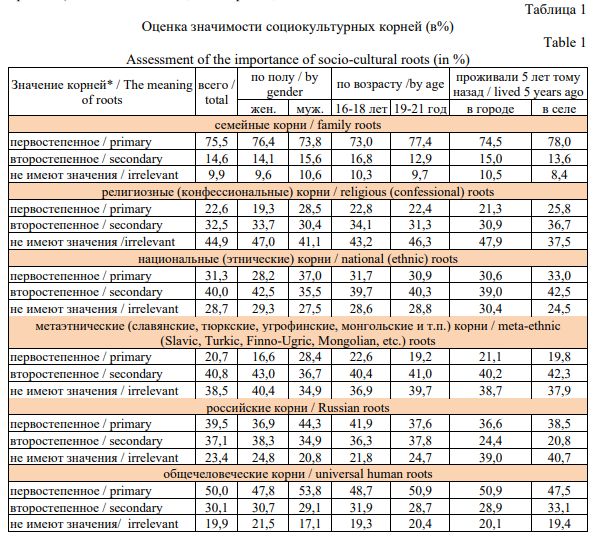
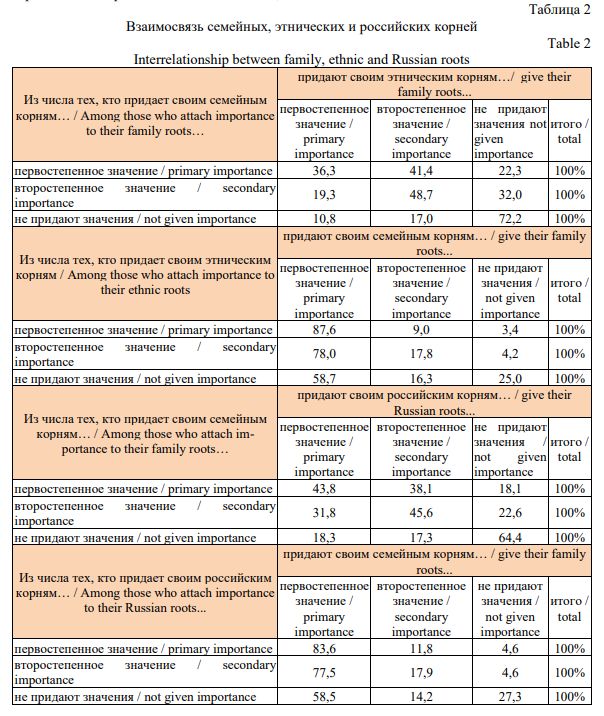
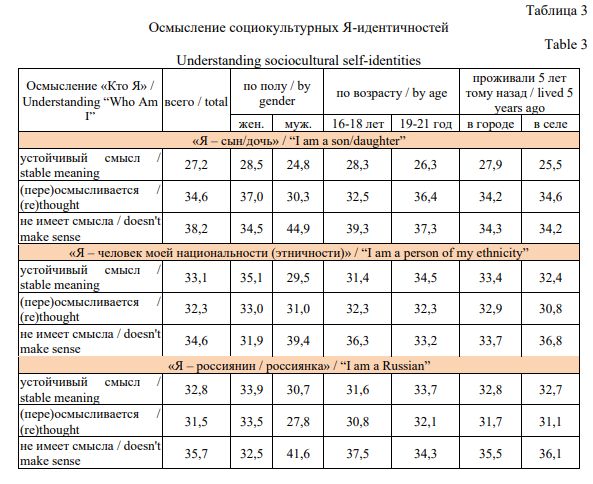
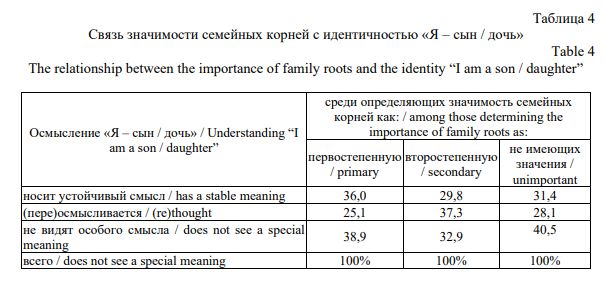
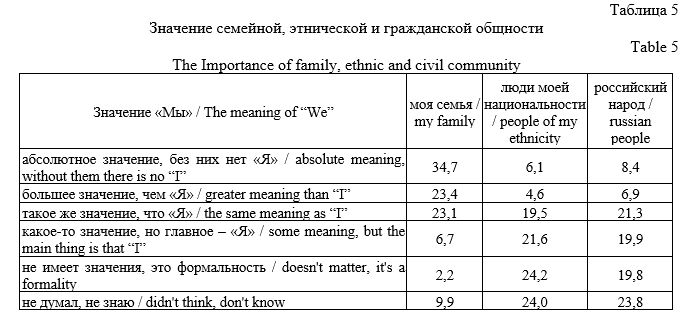
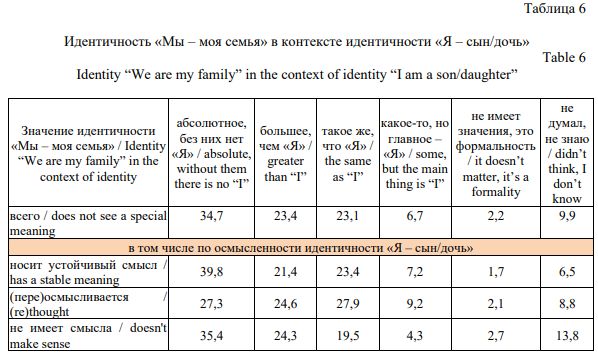



Shaikhislamov, R. B., Asadullina, G. R. (2024), “Family identity in adolescence”, Research Result. Sociology and Management, 10 (4), 64-88. DOI: 10.18413/2408-9338-2024-10-4-0-4


















While nobody left any comments to this publication.
You can be first.
Barash, R. E. (2023), “Family history and country history as facets of a single past. Russian experience in the sociological dimension”, Rossija: edinstvo i mnogoobrazie: k 10-letiju obrazovanija Soveta pri Prezidente Rossijskoj Federacii po mezhnacional'nym otnoshenijam. Materialy Vserossijskoj nauchno-prakticheskoj konferencii [Russia: unity and diversity: on the 10th anniversary of the formation of the Council under the President of the Russian Federation on Interethnic Relations. Proceedings of the All-Russian scientific and practical conference], Moscow, Russia, 137-156. (In Russian)
Barash, R. E. (2023), “Family history and family memory in Russia in the 2020s”, Politija: Analiz. Hronika. Prognoz (Zhurnal politicheskoj filosofii i sociologii politiki), (4), 141-162. (In Russian)
Belik, A. A. (2011), “J. G. Mead's Theory of the “I” and Psychological Anthropology”, Social Psychology and Society, 2 (1), 31-43. (In Russian)
Vagapova, A. R., Perova, S. A. (2015), “Family identity of spouses and their assessment of the degree of satisfaction with marriage”, Izvestiya of Saratov University. Educational Acmeology. Developmental Psychology, 4 (1), 72-76. (In Russian)
Bespalov, A. M., Makarova, O. N., Vlasov, M. S. (2022), “Ethnic identity of Kumandin adolescents: its manifestations and connection with family identity”, Tomsk State University Journal, (484), 207-217. DOI: https://doi.org/10.17223/15617793/484/23 (In Russian)
Burns, R. (1986), Razvitie Ja-koncepcii i vospitanie [Development of the self-concept and education], Progress, Moscow, Russia, 420. (In Russian)
Vasilchenko, O. N. (2013), “Reproductive identity in the structure of the self-concept of personality”, Sovremennye problemy nauki i obrazovanija, (1), 447. (In Russian)
Gorshkov, M. K, Barash, R. E (2024), “Historical memory of modern Russians (the history of Russia in the twentieth century through the prism of family histories)”, Sociological studies, (9), 125-137. DOI: https://doi.org/10.31857/S0132162524090119 (In Russian)
James, W. (2017), Psihologija [Psychology], Piter, St. Petersburg, Russia, 352. (In Russian)
Kamalova, G. R. (2014), “Family identity of modern Russian youth (based on the materials of a sociological study in the Republic of Bashkortostan)”, Teorija i praktika obshhestvennogo razvitija, (20), 19-21. (In Russian)
Kon, I. S. (1989), Psihologija rannej junosti: kniga dlja uchitelja [Psychology of early adolescence: a book for a teacher], Education, Moscow, Soviet Union, 254. (In Russian)
Kon, I. S. (1982), Otkrytie «Ja»: [Samosoznanie] [Discovery of “I”: [Self-awareness]], Avots, Riga, Soviet Union, 336. (In Russian)
Kon, I. S. (1984), V poiskah sebja: lichnost' i ee samosoznanie [In Search of Oneself: Personality and Its Self-Awareness], Politizdat, Moscow, Soviet Union, 335. (In Russian)
Kon, I.S. (1979), Psihologija junosheskogo vozrasta: Problemy formirovanija lichnosti [Psychology of Adolescence: Problems of Personality Formation], Education, Moscow, Soviet Union, 175. (In Russian)
Likhachev, D. S. (1983), Zemlja rodnaja [Native Land], Education, Moscow, Soviet Union, 256. (In Russian)
Lukyanchenko, N. V. (2023), Semejnaja identichnost' sub#ektov raznyh tipov semejnyh sojuzov v sovremennom rossijskom obshhestve [Family identity of subjects of different types of family unions in modern Russian society]: monograph, Krasnoyarsk, Russia, 156. (In Russian)
Malysheva, E. N. (2024), “Organization of social and pedagogical support for the development of family identity in adolescents from large families”, The Times of Science, (3-2), 9-13. (In Russian)
Marx, K. (1983), Kapital [Capital], I (1), Politizdat, Moscow, Soviet Union, 905. (In Russian)
Mead, M. (1988), Kul'tura i mir detstva [Culture and the world of childhood], Nauka, Moscow, Soviet Union, 429. (In Russian)
Molodezhnaja politika v sisteme formirovanija grazhdanskoj identichnosti sovremennoj molodezhi [Youth policy in the system of formation of civil identity of modern youth] (2018), collective monograph, by Bugaev, A.V., Rostovskaya, T.K., Publishing house of RSSU, Moscow, Russia, 198. (In Russian)
Pokolenie Z: mnogoobrazie identichnostej, orientacij, povedenija [Generation Z: Diversity of identities, orientations, and behavior] (2021), collective monograph, by Shaikhislamov, R. B., RIC BashSU, Ufa, Russia, 228. (In Russian)
Rostovskaya, T. K., Kuchmaeva, O. V. (2024), Sem'ja v sisteme social'nyh institutov obshhestva [Family in the System of Social Institutions of Society], Yurait, Moscow, Russia, 331. (In Russian)
Ryazantseva, E. Yu. (2021), “The Relationship between personal projects and life-meaningful orientations in adolescence and young adulthood”, Vestnik of Samara State Technical University. Series: Psychological and Pedagogical Sciences, 18(3), 171-180. DOI: https://doi.org/10.17673/vsgtu-pps.2021.3.12 (In Russian)
Strokova, S. S. (2014), “Directions for the study of family identity in psychology”, Counseling Psychology and Psychotherapy, (3), 8-22. (In Russian)
Solynin, N. E., Maslova, N. A. (2024), “Family identity of adolescents from a single-parent family: structural and functional analysis”, Problemy sovremennogo pedagogicheskogo obrazovanija, (82-1), 485-489. (In Russian)
Tyurina, T. A., Gryazeva, D. V. (2020), “The desire for self-actualization and features of the self-concept in early adolescence”, The Koncept journal, (11), [Online], available at: http://e-koncept.ru/2020/202045.htm (Accessed 19 August 2024). (In Russian)
Tsvyk, V. A., Radkevich, K. V., Shabaga, A. V. (2024), “Language and space as identity values”, RUDN Journal of Sociology, 24 (3), 764-776. (In Russian